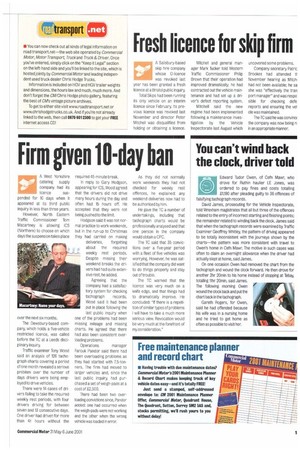Firm given 10-day ban
Page 17

If you've noticed an error in this article please click here to report it so we can fix it.
A West Yorkshire catering supply company had its
licence suspended for 10 days when it appeared at its third public inquiry in less than three years.
However, North Eastern Traffic Commissioner Tom Macartney is allowing ICS (Northern) to choose on which days the suspension takes place over the next six months.
The Dewsbury-based company, which holds a five-vehicle restricted licence, was called before the TC at a Leeds disciplinary inquiry.
Traffic examiner Tony Wood said an analysis of 126 tachograph charts covering a period of one month revealed a serious problem over the number of days drivers were being employed to drive vehicles.
There were 14 cases of drivers failing to take the required weekly rest periods, with four drivers driving for between seven and 13 consecutive days. One driver had driven for more than 4)( hours without the required 45-minute break.
In reply to Gary Hodgson, appearing for ICS, Wood agreed that the drivers did not drive many hours during the day and often had 15 hours oft He accepted that they were not being pushed to the limit.
Hodgson said it was not normal practice to work weekends, but in the run-up to Christmas they had carried on making deliveries, forgetting about the required weekly rest periods. Despite missing their weekend breaks the drivers had had quite extensive rest, he added.
Agreeing that the company had a satisfactory system for checking tachograph records, Wood said it had been put in place following the last public inquiry when one of the problems had been missing mileage and missing charts. He agreed that there had also been consistent overloading problems.
Operations manager Farouk Pander said there had been overloading problems as they had started with 7.5-tonners. The firm had moved to larger vehicles and, since the last public inquiry, had purchased a set of weigh-pads at a cost of 22,500.
There had been two over loading convictions since, Pandor added: one had occurred when the weigh-pads were not working and the other when the wrong vehicle was loaded in error. As they did not normally work weekends they had not checked for weekly rest offences, he explained: any weekend deliveries now had to be authorised by him.
He gave the TC a number of undertakings, including that tachograph charts would be professionally analysed and that one person in the company would obtain a CPC.
The TC said that 35 convictions over a five-year period with a fleet of five vehicles was worrying. However, he was satisfied that the company did want to do things properly and stay out of trouble.
The TO warned that the licence was very much on a knife edge, and that things had to dramatically improve. He concluded: "If there is a repetition of similar types of problems I will have to take a much more serious view. Revocation would be very much at the forefront of my consideration."
































































































